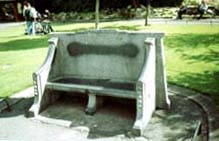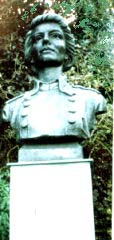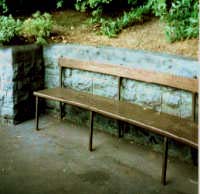The Closing Stages
Cumann na mBan was founded in April 1914 so women could assist the Irish Volunteers in their fight for the freedom of Ireland by such means as fund-raising, making flags and badges and rendering medical aid. However, women could neither join nor have any say in the decisions of the Irish Volunteers many of whom were lukewarm about women's suffrage or even totally against it. Feminists were enraged at this, including Hanna Sheehy Skeffington who attended an early meeting:
|
Suddenly a 'Volunteer' speaker began to ask questions - awkward ones. Was the Irishwomen's Council (Cumann na mBan) to have a place in the Executive (of the Irish Volunteers)? What were the liberties that Irishwomen possessed? What did Irishwomen think of the Cat and Mouse Act and the Government that foisted this alien measure on their countrywomen?
Uproar ensued as Mrs Sheehy Skeffington put these points; the men for whom rifles were to be procured at the sacrifice of 'fur coats' howled to have the insolent one put out; the chair explained that the liberties of Irishwomen did not form part of the constitution of the new society and were 'entirely out of order;' that the only question of interest at present was buying rifles for men, and that nothing else was of the slightest importance to the truly womanly - and the 'unwomanly' in the audience smiled to themselves and thought deep thoughts on the nature of men who cannot buy a rifle unless a woman collects the money - women, the ministering angel of the ambulance class who provides the pyjamas and the lint, but who sinks below the human the moment she asks for a vote!
Report of an early meeting of Cumann na nBan in the Irish Citizen, 9 May 1914.
|
Many groups in Ireland now were splitting, changing, dissolving or regrouping in different forms and women's organisations were no exception. The suffrage movement, mainly middle class up to now, gained working class support when members opposed the 1913 Lock-out and helped to staff the soup kitchens. However those who opposed John Redmond and the Home Rule Bill, those who were critical of Cumann na mBan, those who put 'suffrage first - before all else' came to be seen as non-national or even anti-national in character and lost support at a time of increasing nationalist fervour.
|
English suffragettes suspended all militant action and declared their support for the Government when Britain declared war on Germany on 4 August 1914. The issue was not so simple in Ireland where even unionist suffragists were split on whether to support the war effort or not.
As more and more men were sent to the Front, women took their places in industry and agriculture and were praised for being capable and responsible.
|
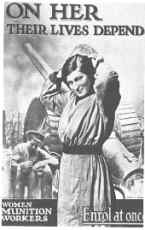
Poster to recruit women
munition workers |
Munition workers performed a variety of jobs, ranging from filling shells and making bullets to assembling detonators. Their hours were long - sometimes 14 hours a day for weeks on end - and their conditions of work known to be dangerous. TNT poisoning, which turned the skin yellow, thus earning the women the nickname of 'Canary Girls' was an occupational hazard.
Paula Bartley, Votes for Women 1860-1928, p.95. |
...Christabel Pankhurst extolled the virtues of living under the British system and pleaded for Britain to support the 'feminine' state of France which had been threatened by the 'over-masculine state' of Germany. God, according to the Pankhursts, was firmly on the British side.
Paula Bartley, Votes for Women 1860-1928, p.89. |
In Ireland the Easter 1916 Rising set in motion a chain of events which had far-reaching results. However, a memorable event of the Rising was Padraig Pearse's reading at the GPO of the Proclamation of the Republic which began with the words 'Irishmen and Irishwomen' and guaranteed 'equal rights and equal opportunities to all its citizens.'
|
The other leader at the GPO garrison was James Connolly who had been outstanding in his support for women's rights. It is believed he was responsible for the strong statement in favour of equality for women in the Proclamation.
|
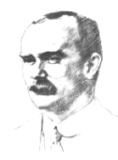
James Connolly
Seán Ó Súilleabháin
National Gallery of Ireland |
It was because women workers had no vote that they had not the safeguards even of the laws passed for their protection, because these were ignored. They had women working for wages on which a man could not keep a dog. Men's conditions bad as they were, had been improved because of the vote.
James Connolly to the IWFL, reported in the Irish Citizen, 13 November 1913. |
In December 1916, Asquith was replaced as Prime Minister by Lloyd George who supported women's suffrage. Many men risking their lives at war were still not entitled to vote so a new suffrage bill was considered necessary to reward them. After much debate in 1917, the Representation of the People Act gave the UK franchise to all men over 21 and to women over 30 who held certain property or other qualifications. Even Asquith, Redmond and the Irish Home Rulers voted in favour this time.
Although it was held that women got the vote because of the work they did during the war, it should be noted that vast numbers of women workers were not given the vote at all. These included female munitions workers whose health had been seriously affected by noxious chemicals: they were mainly working class women under 30 and did not satisfy the property qualifications.
Public opinion was now on the side of votes for women and few wanted a return to militancy after the war. Ex-Prime Minister Asquith, however, was still resentful:
There are about fifteen thousand women on the Register - a dim, impenetrable lot, for the most part hopelessly ignorant of politics, credulous to the last degree, and flickering with gusts of sentiment like a candle in the wind.
H.H. Asquith, referring to the female electorate of Paisley, Scotland in 1920. Quoted in Paula Bartley, Votes for Women, 1860-1928, p.98. |
Women could vote for parliament for the first time at the general election in 1918. It was an occasion of great celebration for the suffragists. Anna Haslam was 89 years old when she first cast her vote on this occasion. Her husband and ally, Thomas had died the previous year and they had both campaigned on this and other women's issues for over sixty years.
Constance Markievicz of the Sinn Féin Party was the first woman to be elected as an MP in a UK election. The Sinn Féin party swept the boards in Ireland winning a large majority of seats but in accordance with their policy, they refused to attend parliament in Westminster and set up Dáil Éireann in Ireland in defiance of the British Government. Constance Markievicz became Minister for Labour in the new Dáil.
Ireland: general election 1918
| Party |
Before election |
After election |
| Unionists |
18 |
26 |
| Sinn Féin |
7 |
73 |
| Home Rulers |
78 |
6 |
| Total |
103 |
105 |
The Constitution of the Irish Free State set up under the terms of the Treaty in 1922 gave the vote to women and men over 21. Women in the UK and Northern Ireland did not get the vote on equal terms with men until 1928.


